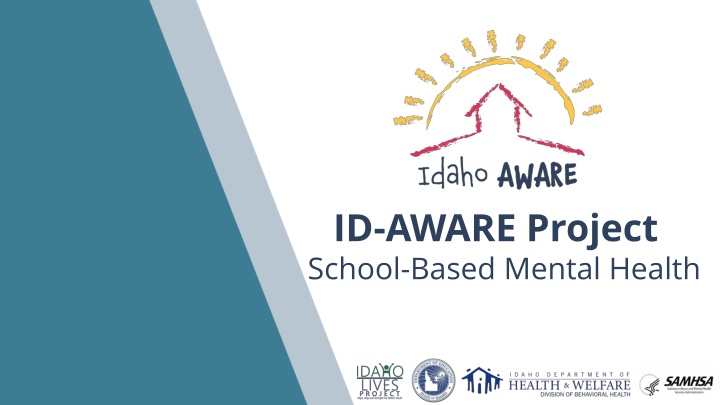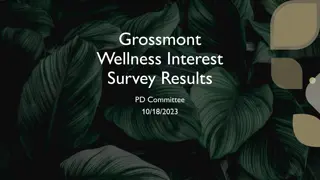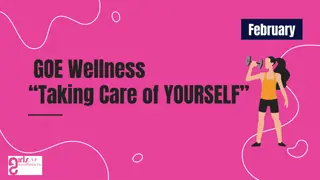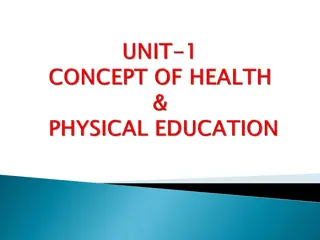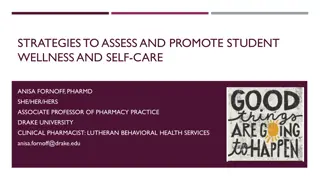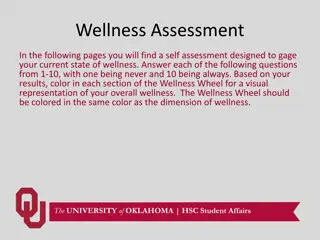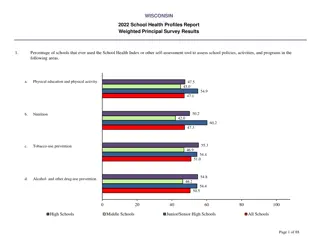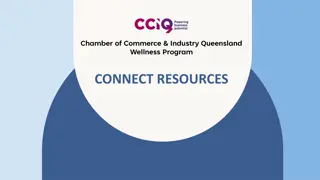ID-AWARE Project: Advancing School-Based Mental Health and Wellness
The ID-AWARE Project aims to enhance mental health services in schools by increasing awareness, providing training for personnel, and connecting youth and families to needed support. Funded by a federal grant, the project focuses on creating healthier school environments and implementing evidence-based interventions through data tracking systems, capacity building, and clinician support.
Download Presentation

Please find below an Image/Link to download the presentation.
The content on the website is provided AS IS for your information and personal use only. It may not be sold, licensed, or shared on other websites without obtaining consent from the author.If you encounter any issues during the download, it is possible that the publisher has removed the file from their server.
You are allowed to download the files provided on this website for personal or commercial use, subject to the condition that they are used lawfully. All files are the property of their respective owners.
The content on the website is provided AS IS for your information and personal use only. It may not be sold, licensed, or shared on other websites without obtaining consent from the author.
E N D
Presentation Transcript
ID-AWARE Project School-Based Mental Health
Project Advancing Wellness and Resiliency in Education (AWARE) Purpose: To build or expand the capacity of State Education and Mental Health Agencies, related to overseeing school-aged youth programs and services, within three local education agencies, to: 1. Increase awareness of mental health issues among school-aged youth; 2. Provide training for school personnel and other adults who interact with school- aged youth to detect and respond to mental health issues; and 3. Connect school-aged youth and their families, who may have behavioral health issues, to needed services.
AWARE Funding and Management Five-year grant awarded to the State Department of Education Project AWARE is a federal grant funded by the Substance Abuse and Mental Health Administration s (SAMHSA) Center for Mental Health Services (CMHS) In September of 2020, the Idaho State Department of Education (SDE) was awarded Project AWARE. Totaling $5.8 million dollars over five years. The SDE contracted the management of this project out to the Idaho Lives Project, which is a program of the SDE under the division of Student Safety and Engagement. The project is co-coordinated by a representative from the Idaho Department of Health and Welfare - Division of Behavioral Health.
ID-AWARE Project Advisory Board Susan Barrett, MA Director of the Center on Social Behavior Supports Old Dominion University Dennis Woody, PhD Pediatric Neuropsychologist, Senior Clinical Program Consultant Optum Kelcey Schmitz, MSEd MTSS/School Mental Health Training and TA Specialist University of Washington, SMART Center Julie Mead, EdS Jackie Yarbrough, MPA, LSW Senior Program Officer Blue Cross of Idaho Foundation for Health Anna Almerico Director Idaho Out-of-School Network Director of Operations, Idaho Special Education Support and Technical Assistance (SESTA) Boise State University- Center for School and Community Partnerships (CSPS)
ID-AWARE Goals Create and sustain data tracking systems to ensure youth receiving intervention are showing improvement Increase the capacity of the LEAs to work preventatively, identifying and supporting students earlier before issues escalate Evidence-based Data Tracking Systems Capacity Link students needs to appropriate evidence- based interventions Interventions Healthier Expand the work of clinicians to support students and their families across all tiers of support Assist in creating healthier school environments School Environments Clinicians
Idaho Landscape Rural and frontier communities experience gaps in services, and schools often struggle to maintain programs and infrastructure to fill these gaps Residents travel greater distances to receive services. Communities tend to have lower socioeconomic status, higher poverty rates, may lack comprehensive health care coverage, and experience a shortage of qualified mental health providers.3 In the schools, student-to-counselor ratio averages 400 to 1, which may reduce a school s ability to intervene, which can exacerbate mental health crise and sometimes require hospitalization.4 9 19 16 Rural Frontier Urban Table: U.S. Census Bureau, Population Division. (2017). Annual Estimates of the Resident Population for the United States, Regions, States, and Peurto Rico. Retrieved from https://www.census.gov/data/tables/2017/demo/popest/state-total.html, 3. Institute of Medicine (US) Roundtable on Environmental Health Sciences, Research, and Medicine; Merchant J, Coussens C, Gilbert D, editors. (2006). Rebuilding the Unity of Health and the Environment in Rural America: Workshop Summary. Washington (DC): National Academies Press. The Social Environment in Rural America. Retrieved from: https://www.ncbi.nlm.nih.gov/books/NBK56967/, 4. National Center for Education Statistics. (2020). Education Demographics and Geographic Estimates. Retrieved from https://nces.ed.gov/programs/edge/Home
Local Landscape At the local level, districts have shared limitations they face. No experience integrating mental health in schools Increased Strain on Community Services: Referring students out to community services can actually increase strain on already burdened community agencies and systems. Experience with integrating mental health in schools Limited Capacity of the Provider: Services can end abruptly, if communities are under-resourced and a larger community need arises. Lacking Infrastructure: Services may be in place, but comprehensive integration isn t being attained and systems/disciplines aren t communicating cohesively. This is a systems issue, not a school issue. Idaho AWARE s goal is to educate school staff and adults about mental health prevention and intervention methods, while simultaneously providing sustainable services to fill immediate needs. Ultimately, the hope is to reduce strain on community services and resources, and eventually advance movement towards prevention-based services and care rather than intervention.
Participating School Districts (LEAS) Kimberly School District ~ ~ Glenns Glenns Ferry School District Ferry School District ~ ~
ID-AWARE LEA Support Elements Professional Development Resources On-site Technical Assitance On-site Clinician Implementation Evaluation and Data Collection/Analysis Community Outreach Events
Professional Development Year 1 Year 2 Year 3 Year 4 Year 5 Statewide Leadership Institute State Advanced Coaching Institute Support for Students Exposed to Trauma (SSET) PART I: Statewide Interconnected Systems Framework (ISF) Team Training Institute PART III: Statewide Interconnected Systems Framework (ISF) Team Training Institute Statewide Coaching Institute Trauma-Sensitive Classroom Practices I-SWIS Facilitator Training SWIS Facilitator Training CICO-SWIS Facilitator Training Cognitive Behavioral Interventions for Trauma in Schools (CBITS) and Bounce Back (BB) Youth Mental Health First Aid Statewide PBIS Tier 3 Team Training Institute Statewide PBIS Tier 1 Team Training Institute Statewide PBIS Tier 2 Team Training Institute PART II: Statewide Interconnected Systems Framework (ISF) Team Training Institute Suicide Prevention Fundamentals Instructions Sources of Strength (at the Elementary and Secondary levels)
ID-AWARE Project Teams Executive Leadership Team (Team of 3-5 individuals) School Leadership Team (Team of 3-5 individuals)
Sources of Strength Secondary Format: 2-day training Purpose: Train Adult Advisors and Peer Leaders in identifying students at-risk of suicide and getting them help, as well as create positive messaging campaigns related to seeking help and connecting with positive/trusted adults. Participants: 5-10 staff members and 30-45 students, per school. Statewide Advance Coaching Institute Format: 1-day professional development session Professional Development Purpose: Increase the participants capacity to influence reflective practices and problem-solving strategies through the use of coaching. Sources of Strength Elementary Format: 2-day training Purpose: Train elementary staff in how to facilitate curriculum for 3rd-5th/6th grade classrooms. Sources of Strength Elementary is not only focused on recognizing warning signs and intervening, but their mission is to discover, teach and celebrate resilience, help-seeking, strength, connection, and belonging. Participants: 2-3 staff elementary members, per school. Participants: YEAR 2 (September 2021 September 2022) Trauma-Sensitive Classroom Practices Format: 1-day professional development session Statewide PBIS Tier 2 Team Training Institute Format: 3-day professional development session CICO-SWIS Facilitator Training Format: 2.5-day professional development session Purpose: Increase knowledge and skills in relation to trauma-sensitive practices. Our goal is to better understand, recognize, and respond to the effects of trauma our students have experienced. Purpose: Support school teams in maintaining their Tier 1 SWPBIS framework while creating a Tier 2 behavioral system Purpose: Build capacity to collect, analyze, and utilize data to make data informed decisions Participants: School Leadership Team Participants: All staff Participants:
On-site Technical Assistance Format: One TA visit per month per LEA Objective: Assist LEAs and schools in the implementation process. Coaching and TA are tailored to meet the specific needs of coaches, schools, and district to support initial adoption through sustained implementation of evidence- based practices.
Objective: Educate the surrounding community in each identified LEA, in schools behavior framework, mental health awareness strategies, and suicide prevention strategies. In addition to understanding mental health and suicide prevention, ensure community members know where to access assistance for an emotional crisis or mental health need. Community Outreach Events
Implementation Evaluations and Data Collection/Analysis Objective: Ongoing evaluation and assessment of implementation process to guide the application of evidence-based practices
On-site Clinician ID-AWARE Project is embedding a full-time licensed clinician into your district, which will: Reduce the burden on school counselors Bolster support by encouraging students and their families to visit your on-site clinician for emotional or mental health crisis Objective: Increase access to mental health services and reduce stigma associated with seeking help. As an extension of your support staff, the on-site clinician will: Participate in student meetings, as well as district trainings and meetings Be accessible to students, staff, and families (we encourage you to consider a central location)
LEA Stipend Conference Registration Opportunities to attend conferences at the state and national levels This stipend will cover all project expenses (i.e., implementation materials, substitutes, travel, stipends, etc.) Resources Statewide School Mental Health Website Objective: The creation of the ID-AWARE Online Information Portal will assist LEAs in their implementation of PBIS, as well as solidifying their ISF. The Information Portal will also help to scale up and to create sustainability of these efforts, as LEAs around the state will have access to, but not limited to, the following: professional development training materials, instructional videos, local examples of PBIS and ISF implementation, domain to network with other educators and mental health providers throughout the state and beyond. www.idahoschoolmentalhealth.org
The Clinicians Role Provide referrals to students, families, and staff. As well as track access to services from those referrals Current, qualified licensure Master's level If not clinically licensed, must receive supervision. Provide individual, family, or group counseling to students and their families, in person Participate in all AWARE and school- based training opportunities Billing: bill based on private and public insurance fee schedules. If not billable, invoice Project AWARE Provide staff and personnel with consultation services Participate as a member of the Executive school team
Idaho AWARE Resources for Clinician Integration Process for Identifying and Selecting a Mental Health Agency/Clinician Parental Consents for Data Collection Budget Plan Examples for Embedding Clinicians Mental Health Agency Interview Questions Idaho School Mental Health Portal Healthy Minds Partnership Roadmap Scope of Work Examples Mental Health Agency Clinician
ID-AWARE Community Support Elements Professional Development and Trainings Stronger Together Conference Parent Education and Support Groups Community Collaborative Meetings
Contact Information Katie Azevedo, EdD ID-AWARE Project Content Specialist Katie@kazevedo.com, https://www.kazevedo.com/ Ali Shields, LMSW Idaho AWARE Project Coordinator ashields@idaholives.org Kristina Cowan, LMSW Idaho AWARE Service Coordinator Amy Balzer, LCSW Idaho AWARE Project Co-Coordinator Amy.balzer@dhw.Idaho. gov For more resources and information, visit our Idaho School Mental Health Website https://idahoschoolmentalhealth.org/
